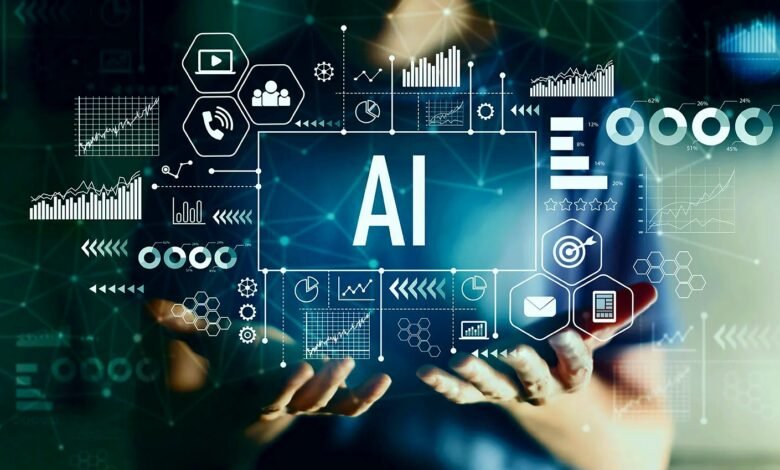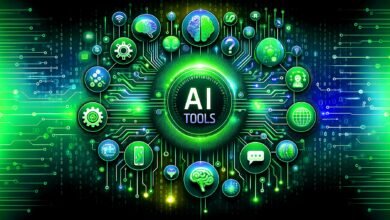How AI is Revolutionizing Education in 2025
This article explores how AI is revolutionizing education in 2025, detailing the applications, benefits, and future prospects of artificial intelligence.

In 2025, the educational landscape is undergoing a profound transformation. Artificial Intelligence (AI) is no longer a futuristic concept; it is now an integral part of classrooms, learning platforms, and administrative processes. The phrase “AI is Revolutionizing Education” is more than a trend—it’s a global reality. With AI technologies maturing and becoming more accessible, educational institutions are embracing these tools to improve learning outcomes, personalize experiences, and streamline operations.
This article explores how AI is revolutionizing education in 2025, detailing the applications, benefits, challenges, and future prospects of artificial intelligence in learning environments.
1. Personalized Learning Through AI
One of the most significant ways AI is revolutionizing education is through personalized learning. AI algorithms analyze student data to tailor educational content to individual learning styles, pace, and preferences. For instance, adaptive learning platforms use AI to identify knowledge gaps and recommend specific resources to bridge them.
In 2025, students benefit from AI-driven tutoring systems that provide instant feedback, suggest exercises based on past performance, and track progress in real time. This personalization enhances engagement and ensures that no student is left behind, catering to both gifted learners and those needing additional support.
2. Intelligent Tutoring Systems
Intelligent Tutoring Systems (ITS) have seen remarkable growth, becoming essential in modern classrooms. These AI-powered tools simulate one-on-one tutoring by responding to student queries, offering explanations, and providing targeted instruction.
AI is revolutionizing education by making quality tutoring accessible to all students, regardless of their geographic or economic background. In 2025, ITS are more intuitive, capable of natural language processing, and can even detect emotional cues to adjust the teaching approach dynamically.
3. Automating Administrative Tasks
AI is not just transforming how students learn but also how institutions operate. Automating administrative tasks is a major area where AI is revolutionizing education. AI tools handle tasks such as grading, scheduling, student enrollment, and performance analytics, freeing up educators to focus more on teaching.
In 2025, AI-driven systems manage vast amounts of data, ensuring accurate and timely reporting. This leads to better resource management, improved compliance, and more efficient educational governance.
4. Enhancing Accessibility and Inclusivity
Another critical way AI is revolutionizing education is by enhancing accessibility. AI technologies like speech-to-text, real-time translation, and text-to-speech tools support students with disabilities and those from diverse linguistic backgrounds.
For example, visually impaired students can use AI-powered readers, while non-native speakers benefit from instant translation and language learning apps. By 2025, inclusive education is more achievable than ever, thanks to AI.
5. Predictive Analytics for Student Success
Educational institutions now use predictive analytics to forecast student outcomes. AI analyzes attendance, grades, behavior, and engagement to identify at-risk students early. Educators can then intervene proactively with targeted support.
AI is revolutionizing education by shifting the focus from reactive to proactive strategies. This predictive capability leads to higher retention rates and improved academic performance, making a measurable difference in students’ lives.
6. Gamification and Immersive Learning
AI has elevated gamification and immersive learning experiences in 2025. By integrating AI with Virtual Reality (VR) and Augmented Reality (AR), students participate in interactive simulations that make learning more engaging.
For example, history lessons come alive through VR tours of ancient civilizations, while science students can explore molecular structures in 3D environments. AI adapts these experiences to individual learning needs, ensuring optimal knowledge retention.
7. AI in Curriculum Development
Curriculum design has also evolved significantly. AI is revolutionizing education by helping educators develop content that aligns with current trends, student needs, and industry demands.
AI systems analyze global data to suggest curriculum updates, identify skill gaps, and recommend resources. In 2025, educators collaborate with AI to create dynamic, relevant, and up-to-date syllabi that prepare students for the future workforce.
8. Language Learning and Translation Tools
Language learning has seen remarkable improvements due to AI. Tools like chatbots and language models provide conversational practice, grammar correction, and real-time translation.
In 2025, AI-powered language platforms use speech recognition and natural language processing to offer personalized learning paths. AI is revolutionizing education by making multilingual education more efficient and accessible worldwide.
9. AI-Driven Assessments and Feedback
Traditional assessments often fail to capture a student’s true capabilities. AI is revolutionizing education by introducing continuous, formative assessment models. These models provide real-time feedback and adapt based on a student’s progress.
Educators in 2025 use AI to create dynamic quizzes, evaluate essays through natural language understanding, and monitor skill development over time. This approach promotes mastery learning rather than rote memorization.
10. Teacher Support and Professional Development
AI supports teachers by offering professional development resources tailored to their needs. From analyzing teaching performance to recommending relevant training modules, AI helps educators grow.
AI is revolutionizing education by turning teachers into lifelong learners. In 2025, smart dashboards provide actionable insights, helping teachers refine their strategies and stay current with educational innovations.
11. Enhancing Student Engagement
Engagement is a cornerstone of effective learning. AI tools analyze student behavior to identify engagement levels and adjust teaching methods accordingly. This ensures that lessons remain interactive and captivating.
By 2025, virtual assistants, gamified platforms, and interactive videos powered by AI keep students motivated. AI is revolutionizing education by making learning more immersive and fun.
12. Data-Driven Decision Making in Education
AI empowers schools and policymakers with data-driven insights. From resource allocation to curriculum planning, AI systems provide evidence-based recommendations.
In 2025, institutions leverage AI dashboards to monitor performance, track trends, and implement changes swiftly. This data-centric approach is another way AI is revolutionizing education, promoting transparency and accountability.
13. AI-Powered Career Counseling
Career guidance has become more precise with AI. Algorithms analyze student interests, academic records, and market trends to suggest optimal career paths.
AI is revolutionizing education by making career planning data-driven. In 2025, students receive personalized advice, internship opportunities, and skill-building resources based on AI assessments.
14. Online Learning Platforms and MOOCs
Massive Open Online Courses (MOOCs) and e-learning platforms use AI to provide customized learning experiences. AI curates content, recommends modules, and tracks progress.
In 2025, AI-enhanced MOOCs offer interactive support, peer collaboration tools, and real-time feedback. This transformation showcases how AI is revolutionizing education across digital ecosystems.
15. Bridging the Digital Divide
While digital inequality remains a concern, AI is helping to bridge the gap. Low-cost AI solutions, mobile learning apps, and cloud-based platforms bring quality education to underserved areas.
AI is revolutionizing education by democratizing access. In 2025, remote and rural students benefit from the same AI-driven tools as their urban counterparts, reducing educational disparities.
Conclusion: A Smarter Future Through AI
The impact of AI in education is profound and far-reaching. From personalized learning and teacher support to data-driven insights and global accessibility, AI is revolutionizing education in ways previously unimaginable.
As we move forward, it’s essential to balance technological advancement with ethical considerations. Ensuring data privacy, reducing algorithmic bias, and maintaining human oversight will be critical to sustainable success.In 2025 and beyond, the synergy between human educators and AI technologies promises a smarter, more inclusive, and more effective educational system. The phrase “AI is revolutionizing education” will continue to resonate, not as a prediction, but as an enduring reality shaping the future of learning.











